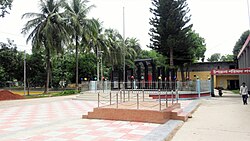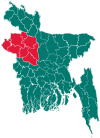Paba Upazila
Paba Upazila পবা উপজেলা | |
|---|---|
 Shaheed Minar in Paba Upazila | |
 | |
| Coordinates: 24°26.5′N 88°37.7′E / 24.4417°N 88.6283°E | |
| Country | |
| Division | Rajshahi |
| District | Rajshahi |
| Area | |
• Total | 340.03 km2 (131.29 sq mi) |
| Population | |
• Total | 368,889 |
| • Density | 1,100/km2 (2,800/sq mi) |
| Time zone | UTC+6 (BST) |
| Website | Official Map of Paba |
Paba Upazila (Bengali: পবা উপজেলা) is an upazila of Rajshahi District in the Division of Rajshahi, Bangladesh.[2]
Geography
Paba is located at 24°26′30″N 88°37′40″E / 24.4417°N 88.6278°E. It has 76,622 households and an area of 340.03 km2.
Paba Upazila is bounded by Mohanpur and Tanore Upazilas on the north, Puthia and Durgapur upazilas on the east, Bhagawangola II and Raninagar II CD Blocks, in Murshidabad district, West Bengal, India, across the Padma, and Charghat Upazila, on the south, and Godagari Upazila on the west.[3][4]
Demographics
According to the 2011 Census of Bangladesh, Paba Upazila had 76,622 households and a population of 314,196. 62,379 (19.85%) were under 10 years of age. Paba had a literacy rate (age 7 and over) of 50.31%, compared to the national average of 51.8%, and a sex ratio of 970 females per 1000 males. 85,732 (27.29%) lived in urban areas.[6] Ethnic population was 2,913 (0.93%).[7]
According to the 1991 Bangladesh census, Paba had a population of 213,379, of whom 108,810 were aged 18 or over. Males constituted 51.7% of the population, and females 48.3%. Paba had an average literacy rate of 25.1% (7+ years), against the national average of 32.4%.[8]
Administration
Paba Upazila is divided into Katakhali Municipality, Noahata Municipality, and eight union parishads: Baragachhi, Damkur, Darshan Para, Haragram, Harian, Haripur, Hujuri Para, and Parila. The union parishads are subdivided into 186 mauzas and 209 villages.[6]
See also
References
- ^ National Report (PDF). Population and Housing Census 2022. Vol. 1. Dhaka: Bangladesh Bureau of Statistics. November 2023. p. 402. ISBN 978-9844752016.
- ^ Md. Ruhul Islam (2012), "Paba Upazila", in Sirajul Islam and Ahmed A. Jamal (ed.), Banglapedia: National Encyclopedia of Bangladesh (Second ed.), Asiatic Society of Bangladesh
- ^ "Paba Upazila". Banglapedia. Retrieved 15 November 2018.
- ^ "Tehsil Map of Murshidabad". CD Block/ Tehsil. Maps of India. Retrieved 15 November 2018.
- ^ Population and Housing Census 2022 - District Report: Rajshahi (PDF). District Series. Dhaka: Bangladesh Bureau of Statistics. June 2024. ISBN 978-984-475-230-6.
- ^ a b "Bangladesh Population and Housing Census 2011 Zila Report – Rajshahi" (PDF). bbs.gov.bd. Bangladesh Bureau of Statistics.
- ^ "Community Tables: Rajshahi district" (PDF). bbs.gov.bd. Bangladesh Bureau of Statistics. 2011.
- ^ "Population Census Wing, BBS". Archived from the original on 27 March 2005. Retrieved 10 November 2006.

